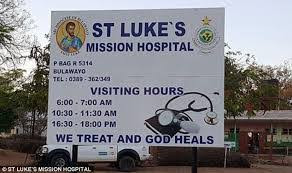
HARARE, Feb 10 (NewsDayLive) - Developed countries owe Africa a staggering US$36 trillion in climate debt, which is part of a larger $107 trillion bill owed to low and lower-middle-income countries, a report by ActionAid has revealed.
The report, titled ‘Who Owes Who? External debts, climate debts and reparations in the Jubilee year’, published in the week leading up to the African Union Heads of States Summit in Addis Ababa, shows that the unpaid debts owed to Africa far exceed the external debts that African nations are forced to pay.
This report comes ahead of the summit next week and it reveals that over three quarters of all lower-income countries spend more on foreign debt than on their own health care systems.
“54 countries are in a debt crisis, forced to cut their spending on basic public services and climate action in order to pay external debts.
"Low- and lower-middle income countries between them have a total external debt of US$1.45 trillion and in 2023 alone paid US$138 billion just to service their debts, sacrificing people’s rights and sustainable national development to satisfy their wealthy creditors,” read the report.
“Over 75% of all low- and lower-middle income countries spend more on debt servicing than they do on health care. Indeed, in 55% of countries, spending on debt servicing is now more than double that of spending on health."
According to the findings, the current reality has a devastating impact on the majority of people, especially women, young people and "those on low incomes".
ActionAid Zimbabwe country director Joy Mabenge said:
- Pay civil servants : Action Aid Zimbabwe
- ‘Capacitate smallholder farmers’
- ActionAid writes to ED over food prices
- Letter from America: A new culture war is brewing over abortion
Keep Reading
“In this Jubilee year, we need a fundamental overhaul of the global financial architecture, shifting the power over debt away from the IMF to a more representative and inclusive UN body.”
The report also stressed that the rich countries are pushing Africa to the brink by forcing poor countries to prioritise debt repayment over essential services such as health and education, or responding to the runaway climate crisis.
"It is a travesty that African nations are being crushed under the weight of foreign debt, while the world's richest countries continue to look the other way, evading their responsibility to pay for the climate crisis and reparations related to the slave trade and unfair economic practices,” ActionAid secretary general Arthur Larok said.
Meanwhile, the AU’s declaration is that 2025 is the Year of Reparations and presents an opportunity to stand up to both historical injustices and the continuing injustices that arise from the colonial international financial architecture.










